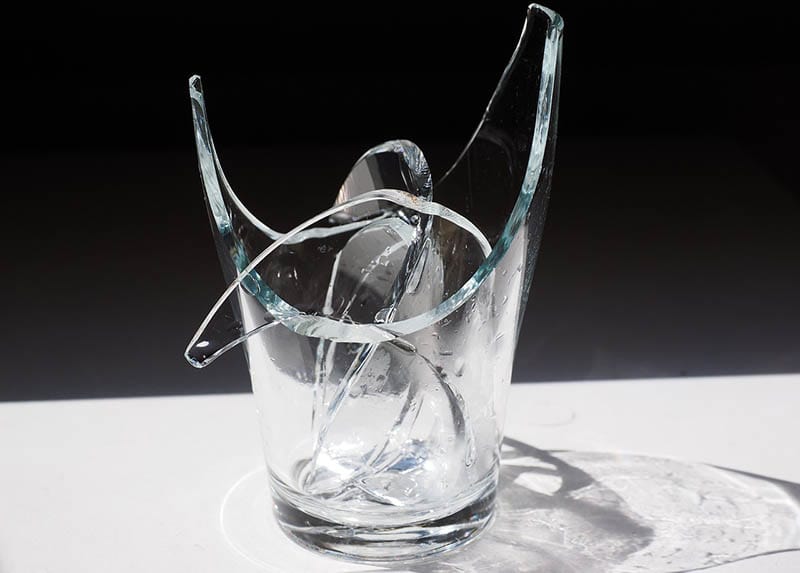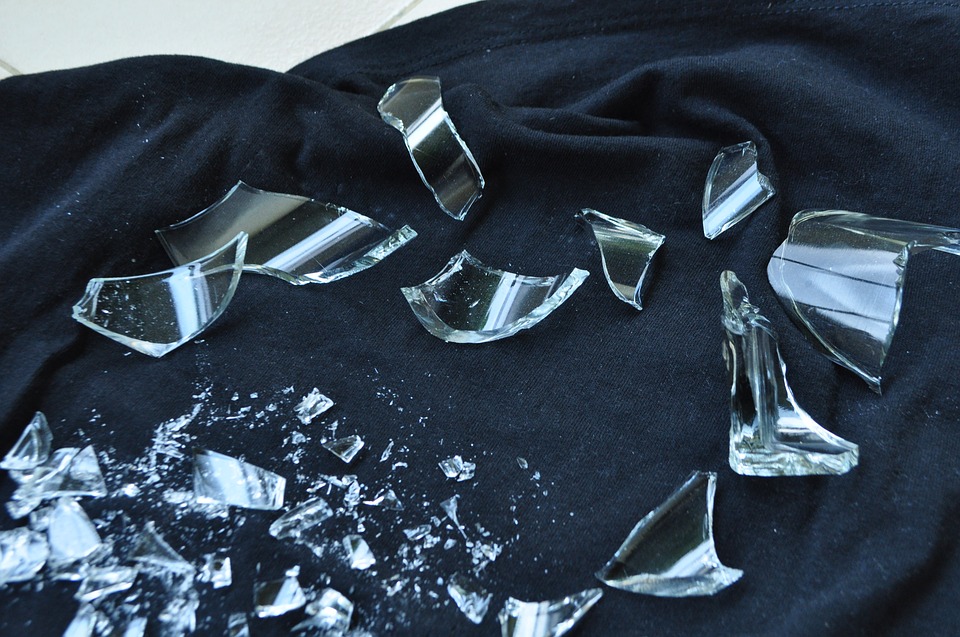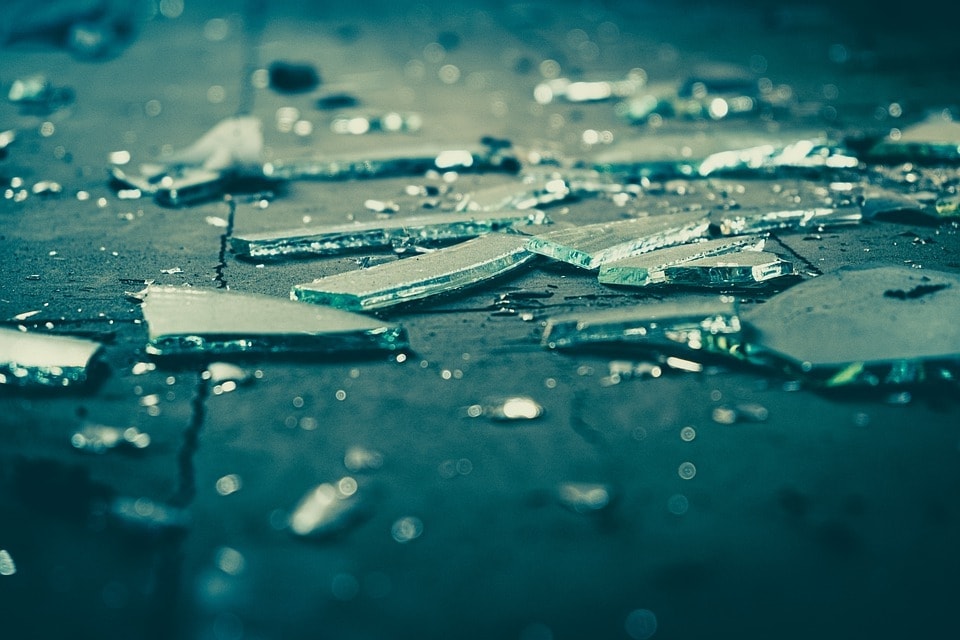Can you Recycle Broken Glass? Proper Disposal & FAQ
-
Greg Iacono
- Last updated:

Most experts agree that glass is one of the most important materials humans have ever invented. There are thousands of products made with glass, including the bottles we drink from, glass windows, and the glass fiber-optic cables that allow you to read this article. Without glass, the world would be a very different place, at least for humans. Unfortunately, you can’t recycle broken glass because recycling companies don’t accept it.
The problem is that recycling plants aren’t equipped to handle broken glass, especially if it needs to be removed and separated from other recycled items. For most consumers, the only way to dispose of broken glass is to put it in with your regular garbage. In this article, we’ll discuss the safest method to dispose of broken glass and the types of glass that can be recycled.
How to Dispose of Broken Glass

Glass items are relatively easy to break, and accidents happen. When they do, you must dispose of the broken glass carefully so that you don’t hurt yourself or hurt the team from your local garbage company. Here’s how:
Pick up the Large Glass Pieces
First, you need to pick up the glass from wherever you broke it, which means donning heavy rubber gloves and using a dustpan and broom to sweep up the large pieces. Be careful and wear shoes or sandals to protect your feet.
Vacuum the Tiny Glass Shards
Next, vacuum up all of the tiny shards of glass. A broom is better for large pieces since the small shards can strike the bristles.
Use a Piece of Bread to Pick up the Tiniest Glass Shards
This tip might sound silly, but it works like a charm. Using a fresh piece of bread (the end is best because everyone hates that piece), slowly wipe it in the area where you broke the glass. The bread will grab even the tiniest shards of glass that your vacuum might have missed, but be sure to wear gloves.
Wrap in Newspaper
Now that all the glass has been cleaned up, place the broken shards carefully into a newspaper, wrapping paper, cardboard, or some other protective barrier, and dump it in your regular garbage container.
Large Glass like Mirrors or Windows
If there is a substantial amount of broken glass, like a mirror or window, consider placing it directly in your large outdoor garbage can. You can also wrap the glass in an old blanket or a large piece of cardboard.
Remember that the glass should fit completely inside your large garbage can so the lid can close. If necessary, you may have to break the glass or mirror more once it’s in the container to fit. If you do, wear protective clothing, gloves, and eye protection.
FAQs
Can Broken Glass be Placed in your Recycling Bin?
Although it seems to make sense, most recycling plants won’t accept broken glass in their recycling containers as it poses a substantial risk to the employees who collect the glass. A few will take it, but you need to contact your recycling center for information about their specific rules and regulations. They might, for example, require a separate container for broken glass.
Can Broken Actually Glass be Recycled?
Broken glass is recyclable and can be reused to make new glass products. Unfortunately, it’s almost impossible to recycle it because recycling plants won’t accept it.
Glass can be reused repeatedly, and there is no noticeable decrease in quality. New glass products made from recycled glass, broken or not, will have the same qualities as first-generation glass.
However, the problem is that broken glass is hazardous to the people who collect it, process it, and so forth. Also, separating broken glass from other recycled materials isn’t easy and demands special equipment that many recycling plants don’t have.

Is Broken Glass Biodegradable?
Most consumers are under the false impression that broken glass (or any glass, for that matter) is biodegradable. The truth is, due to the extreme heat used when manufacturing glass, glass doesn’t biodegrade, even after it’s been broken.
Furthermore, the tiny creatures usually involved in breaking down waste, namely mycobacterium and pseudomonas, cannot break down the glass, even when all of the other factors necessary for biodegradation are available and present.
Scientist estimate that the typical glass from glass jars, glasses for drinking, and other glass products will take up to 4000 years to decompose entirely because they are so highly resistant to typical decomposition factors.
Ironically, the qualities that make glass such an excellent and valuable material, including its ability to resist corrosion, its durability, and others, also make it one of the worst products in terms of biodegradability. In short, the glass will stick around for a very long time, broken or not.
Is Broken Glass a Biohazard?
While broken glass can’t be isn’t biodegradable, the good news is that, in most cases, it’s not a biohazard. For example, a glass jar, the glass from a window in your home, a mirror, and other items made from glass won’t cause any environmental problems when disposed of properly.
However, glass manufactured into products like light bulbs and cathode ray tubes can be problematic for the environment and must be disposed of properly. Light bulbs are one of the biggest biohazards in glass because they are made with a mixture of glass and, in some instances, contain toxic substances like mercury and other biohazards.
Is Glass Bad for the Environment?
Compared to plastic and paper, glass is much better for the environment. You can recycle it almost endlessly, and the resource needed to make glass is highly abundant on the planet since it’s basically sand. In other words, there’s no worry that we will run out of the materials needed to make new glass, although it does use quite a bit of energy when manufactured.
One bit of good news is that, when recycled, less energy is needed to turn broken glass into new glass products. Even better, the manufacturing processes used to make and recycle glass today are more efficient than ever. While recycling broken glass might not be easy because it’s dangerous to handle, it’s much more recyclable than almost any other material humans have created and uses less energy than most other products.
Final Thoughts
What’s so ironic about glass is that, as recyclable as it might be, recycling broken glass is difficult, if not impossible. Because it’s a safety hazard for the recycling staff, very few recycling plants will allow you to send them your broken glass, forcing you to dispose of it in your regular trash. The only saving grace is that most glass products (with a few notable exceptions) are not biohazards and are not damaging to the environment.
Remember that if it’s not broken, almost all glass products should be recycled to reduce the amount of trash going into landfills. If you’ve just broken something made of glass, be careful cleaning it up and best of luck disposing of it properly.
- https://cen.acs.org/materials/inorganic-chemistry/glass-recycling-US-broken/97/i6
- https://recyclecoach.com/blog/is-broken-glass-recyclable/#:~:text=The%20bottom%20line%20is%20that,broken%20glass%20from%20other%20recyclables.
- https://www.cleanipedia.com/gb/sustainability/dispose-broken-glass-safely.html
- https://www.conserve-energy-future.com/is-glass-biodegradable.php#:~:text=Broken%20glass%20is%20not%20biodegradable,change%20its%20non%2Dbiodegradable%20nature.
- https://www.millenniumrecycling.com/what-types-of-glass-can-be-recycled/
Featured Image Credit: Hans, Pixabay
Contents
